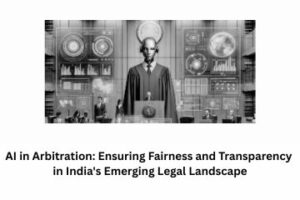Electoral Bonds Judgment: Transparency vs Anonymity in Political Funding
Written by Mahima Chopra
Table of Contents
- Introduction
- What Are Electoral Bonds?
- Legal Challenges to the Electoral Bond Scheme
- The Supreme Court Judgment: A Landmark Verdict (Feb 2024)
- Arguments in Favor of Electoral Bonds (Before the Judgment)
- Transparency vs. Anonymity: The Central Dilemma
- Implications of the Judgment
- Global Perspective on Political Funding Transparency
- Conclusion
Introduction
The Supreme Court of India’s landmark judgment on electoral bonds in February 2024 brought long-awaited clarity to one of the most contentious issues in Indian democracy—political funding. While electoral bonds were introduced in 2017 as a mechanism to cleanse political donations and curb black money, critics have long argued that the system promotes opacity, corporate favoritism, and undermines voter rights.
In a unanimous verdict, the Supreme Court declared the electoral bond scheme unconstitutional, striking down the amendments made to key laws such as the Representation of the People Act, the Income Tax Act, and the Companies Act that facilitated anonymous donations. This decision marks a turning point in India’s political finance landscape and raises broader questions about the balance between transparency and donor anonymity.
This article explores the origins of the electoral bond scheme, the legal and constitutional issues raised before the Supreme Court, key observations from the judgment, and the implications for the future of political transparency and democratic accountability.
What Are Electoral Bonds?
Electoral bonds were introduced by the Government of India in 2017 through the Finance Act and were implemented in 2018. They allowed individuals, companies, and organizations to purchase bonds from the State Bank of India (SBI) and donate them to registered political parties, which could then encash these bonds through designated accounts.
Key Features:
- Available in denominations ranging from ₹1,000 to ₹1 crore.
- Can be purchased only through the SBI.
- Donor identity kept confidential from the public.
- Political parties were required to redeem the bonds within 15 days.
- Only parties that secured at least 1% of votes in the last general or state election were eligible to receive bonds.
Legal Amendments to Facilitate the Scheme:
- Income Tax Act: Donors no longer required to disclose political contributions in tax filings.
- Representation of the People Act: Political parties exempted from reporting details of donations received via bonds.
- Companies Act: Removed cap on corporate donations (previously 7.5% of average net profits over 3 years) and allowed unlimited contributions without disclosure.
Legal Challenges to the Electoral Bond Scheme
Multiple petitions were filed before the Supreme Court by civil society groups, including the Association for Democratic Reforms (ADR), Common Cause, and individuals, arguing that the scheme violated:
- Article 19(1)(a) – Freedom of speech and expression, particularly the right of voters to know the sources of political funding.
- Article 14 – Equality before the law, by creating a non-level playing field for smaller parties.
- Article 21 – Right to informed participation in a democracy.
The petitioners contended that anonymity in political donations shields corruption, enables quid pro quo between corporates and political parties, and weakens the integrity of democratic processes.
The Supreme Court Judgment: A Landmark Verdict (Feb 2024)
In a unanimous decision, a 5-judge Constitution Bench of the Supreme Court struck down the electoral bond scheme and associated amendments as unconstitutional.
Key Observations of the Court:
- Right to Know
- The Court reaffirmed the voter’s “right to know” under Article 19(1)(a) as essential to a functioning democracy.
- Anonymity in political donations prevents citizens from evaluating whether a party’s policies are influenced by corporate donations.
- Disproportionate Impact
- The Court noted that the scheme disproportionately favored the ruling party, which received a majority of the donations.
- It observed that larger corporates donating anonymously could distort electoral competition.
- Violation of Equality
- By allowing unlimited corporate donations without disclosure, the scheme gave undue advantage to wealthy entities, violating the principle of equality in political participation.
- Striking Down Amendments
- The Court invalidated amendments to:
- Section 29C of the Representation of the People Act
- Section 182 of the Companies Act
- Section 13A of the Income Tax Act
- It held that these amendments, passed as part of the Money Bill process, subverted parliamentary procedure and evaded Rajya Sabha scrutiny.
- The Court invalidated amendments to:
- Direction to SBI
- The Supreme Court directed the State Bank of India to disclose details of all electoral bond purchases and donations made from 2019 onward, including the identity of the purchaser and the recipient political party.
Arguments in Favor of Electoral Bonds (Before the Judgment)
Despite the criticism, the government had defended the scheme on several grounds:
- Curbing Black Money: By routing donations through banking channels, the scheme was seen as a way to reduce unaccounted cash contributions.
- Donor Anonymity: The government argued that anonymity would protect donors from political retribution or victimization by opposing parties.
- Increased Donations: A rise in political funding via formal mechanisms was cited as evidence of success.
However, the Court concluded that the cost to transparency and electoral fairness outweighed these purported benefits.
Transparency vs. Anonymity: The Central Dilemma
The electoral bond case brought to the fore a fundamental tension between transparency and donor privacy in a democratic society.
Transparency is critical because:
- It allows voters to evaluate whether policy decisions are influenced by private interests.
- It deters corruption and undue influence by revealing who funds political parties.
- It promotes accountability in electoral finance.
Anonymity, while protecting donors from backlash, may:
- Obscure conflicts of interest.
- Encourage favoritism in government contracts or policies.
- Weaken the democratic principle of informed choice.
The judgment clearly sides with the primacy of transparency in political funding, stating that privacy cannot be used as a shield to bypass accountability in electoral processes.
Implications of the Judgment
1. Shift Toward Transparency
- All political parties will now be required to disclose details of contributions received through electoral bonds.
- The public will gain access to critical information about who funds whom, and when.
2. Increased Scrutiny of Corporate Donations
- The removal of the cap on corporate donations has been reversed.
- Companies must now disclose their political contributions again, promoting shareholder and public oversight.
3. Strengthening Electoral Integrity
- The judgment reinforces the role of the judiciary in upholding constitutional values in electoral processes.
- It may set the stage for broader reforms in campaign finance regulation.
4. Political Repercussions
- The ruling affects the finances of all political parties, particularly the ruling party, which was the biggest beneficiary of electoral bonds.
- May lead to greater demand for state funding of elections or a regulatory authority on political finance.
Global Perspective on Political Funding Transparency
Globally, many democracies emphasize transparency in political funding:
- United States: Political donations must be disclosed under the Federal Election Campaign Act.
- United Kingdom: Donations above a threshold must be publicly reported.
- Canada: Limits and disclosures are mandated for both individuals and corporations.
India’s return to a disclosure-based regime brings it more in line with international democratic standards.
Conclusion
The electoral bond judgment is a watershed moment in India’s democratic journey. It reasserts the principle that voters have a right to be informed and that transparency is essential for free and fair elections. By striking down a system that prioritized anonymity over accountability, the Supreme Court has reaffirmed the foundational role of electoral integrity in constitutional democracy.
Moving forward, this verdict should serve as a catalyst for comprehensive reforms in political finance, including caps on donations, real-time disclosures, and stronger enforcement mechanisms to ensure that elections are not just free, but also fair and transparent.




